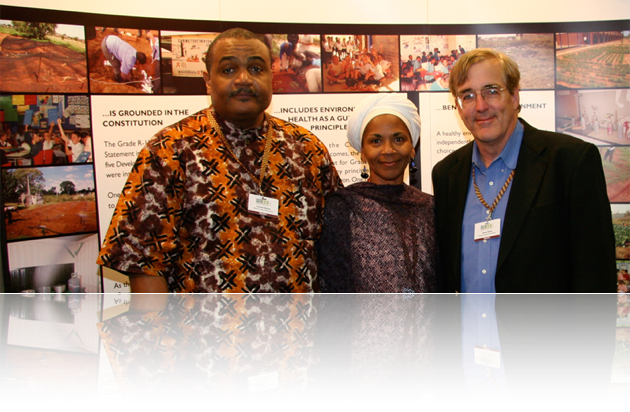The Partnership for a Green City Goes to the
2007 World Environmental Education Congress
By Aukram Burton


(L to R) Aukram Burton, Multicultural/Diversity Specialist in the Jefferson County Public Schools Division of Community Development and Governmental Relations; Nefertiti Burton, Associate Professor in the Department of Theatre Arts at the University of Louisville and Dr. David Wicks, Director of the JCPS Center for Environmental Education at the Opening Reception of WEEC 2007. (Photo by Seung Woo KIM)
The Partnership for a Green City began in August 2004, as a major step toward overcoming challenges to Louisville's environmental practices. The Partnership represents a collaborative effort to improve environmental education, environmental health, and environmental management by three of Louisville's largest public entities: Louisville Metro Government, the University of Louisville, and the Jefferson County Public Schools.
Stories of climate change and its impact on the earth’s ecosystems, water resources, human settlements and biodiversity are becoming more prevalent in media reports worldwide. But is it enough for the world’s population to rely on corporate controlled media as our sole source for environmental education?
The world's first intergovernmental conference on environmental education was organized by the United Nations Education, Scientific, and Cultural Organization (UNESCO) in cooperation with the U.N. Environment Program (UNEP) and was convened in Tbilisi, Georgia (USSR) from October 14-26, 1977. Principles were adopted to help guide efforts to develop environmental education at the national, regional, and global levels and to emphasis the important role of environmental education in the preservation and improvement of the world's environment.
Since the Tbilisi Principles on education and environment were released in 1977, environmental education has created many opportunities for critical and creative thinking, teaching, learning, raising awareness and taking action. Three decades later “Learning In A Changing World” was the theme of the 4th World Environmental Education Congress (WEEC 2007) held in Durban, South Africa on July 2 – 6, 2007). The goal of WEEC 2007 was to provide creative opportunities for dialogue, reflection and evaluation in a period where teaching and learning about the values and goals of sustaining our environment is critical. WEEC 2007 comes at a time when schools, community organizations, businesses and governments around the world are challenged to respond to unprecedented environmental changes and the impact that these changes are having on our economic, political, social and cultural realities.
Theatre for a Sustainable Planet

Nefertiti Burton conducts an exercise during a workshop entitled, “Theatre for a Sustainable Planet” at WEEC 2007. Workshop participants included artists, teachers and development workers from the Congo, Gabon, South Africa, Japan, Korea, the United Kingdom, Australia, Canada, Puerto Rico, and the United States. (Photo by Aukram Burton)
The team representing the partnership presented a workshop entitled, Intersection of Environment, Culture, and the Arts in Education. The workshop focused on how JCPS, the 13th largest urban school district in the United States, is collaborating with U of L, a metropolitan university to develop and provide resources that connect environmental education, diversity, and the arts across the school curriculum.
The workshop exposed congress participants to a number of partnership initiatives, such as the:
-
(1) Environmental Justice Tour: A bus tour of environmental issues that face Louisville’s poor communities;
-
-
(2) Touring Performances for K-12 Classrooms: Over the past five years the University of Louisville’s Repertory Company and Jefferson County Public Schools have collaborated to bring plays with abiding themes of awareness and respect for the centrality of the environment in the lives of human beings;
-
-
(3) Professional Development: Learn strategies for providing students with rich experiences in critical thinking, multicultural understanding, and the creative process;
-
-
(4) Global Connections: Staying in Touch with Culture and the Environment: The office of Diversity and Multicultural Education and the Center for Environmental Education in JCPS collaboratively produce a newsletter entitled Global Connections: Staying in Touch with Culture and Environment. The newsletter is dedicated to connecting Multicultural Education and Environmental Education as a resource to help parents, teachers, and students increase environmental literacy and sustain a knowledge base for diversity.
The WEEC 2007 experience included not only keynote papers, research-based papers, poster presentations, workshops and round tables, but also a number of exciting cultural events and scientific tours. WEEC 2007 enabled a cultural exchange between educators, development workers, cultural workers, researchers, policymakers and others from around the world with the aim of strengthening education for sustainability, theory, practice, creativity and new ways of living together.